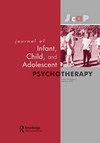神经认知障碍患者的心理治疗
Q3 Psychology
Journal of Infant, Child, and Adolescent Psychotherapy
Pub Date : 2022-01-02
DOI:10.1080/15289168.2022.2050659
引用次数: 0
摘要
神经分化儿童、青少年和成人都表现出学习和注意力方面的挑战,导致学业和社会失败。这些障碍的情感后果包括:自尊心降低、普遍的羞耻感、对学术技能的深刻不安全感以及深刻的脆弱感。在许多情况下,抑郁和焦虑的症状是这些挑战的直接后果。因此,许多有神经认知困难的患者会向心理治疗师寻求帮助,以减轻他们的精神症状。因此,临床医生必须注意各种类型的学习障碍,了解它们对发展中的心理的影响,并能够促进对这些问题的洞察力和认识。我将概述不同类型的学习障碍,回顾在这些障碍患者的心理治疗中发现的常见心理主题的文献,然后介绍病例史,说明治疗和有效干预的主题。这些干预将包括心理教育、洞察力导向和关系技术。本文章由计算机程序翻译,如有差异,请以英文原文为准。
Psychotherapy with Patients with Neurocognitive Impairments
ABSTRACT Neurodivergent children, adolescents, and adults demonstrate both learning and attention challenges that contribute to academic and social failures. The emotional consequences of these disorders include: lowered self-esteem, pervasive feelings of shame, profound insecurity about academic skills, and a deep sense of vulnerability. In many cases, symptoms of depression and anxiety are direct consequences of these challenges. Thus, many patients with neurocognitive difficulties will consult with psychotherapists for help in alleviating their psychiatric symptoms. It is therefore essential that clinicians are mindful of the various types of learning disorders, understand their impact on the developing psyche, and are able to facilitate insight and awareness of these issues. I will provide an overview of the different types of learning disorders, review the literature on common psychological themes found in the psychotherapy of individuals with these disorders, and then present case histories illustrating both themes in treatment and effective interventions. Such interventions will include psychoeducational, insight-oriented, and relational techniques.
求助全文
通过发布文献求助,成功后即可免费获取论文全文。
去求助
来源期刊

Journal of Infant, Child, and Adolescent Psychotherapy
Psychology-Clinical Psychology
CiteScore
1.70
自引率
0.00%
发文量
37
 求助内容:
求助内容: 应助结果提醒方式:
应助结果提醒方式:


